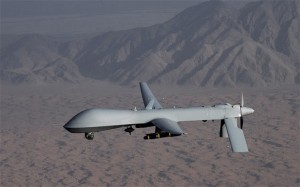Rand Paul’s dramatic filibuster before the Senate generated a great deal of public debate in recent weeks, and for good reason. Paul has drawn attention to an egregious expansion of the drone program rationale to include targeting of American citizens on American soil, which believed to stretch the already wildly stretched parameters of the Patriot Act. The current policy circumvents the normal rules of judicial arraignment, thinks Paul. His concern corresponds to a wider public worry over the terrific escalation of the drone program, an anxiety that has not been at all assuaged by the Attorney General’s repeated demand for freedom to strike any “immanent threat,” even if domestic. The report of a new base to support drone activities in North Africa is but another telling indicator of the program’s ambition.

The president relented to demands from senators to disclose 11 classified legal memos in which his administration argues that it has the authority to use drone strikes to kill terror suspects who are US citizens; Photo: REUTERS
Important as Paul’s argument is for public debate, it grasps the moral problems surrounding the drone program only partially. In truth the entire drone program, including its foreign activities, is premised on the acceptance of distinct moral compromises. We are told that unmanned drone tactics present two new opportunities in the war on terror, both desirable and without precedent: reduced risk of pilot casualties and increased targeting precision. On the face of it, admittedly, these opportunities appear attractive. But their attractiveness ought not distract the opportunistic character of these ends. So far, all rationale offered by officials have appealed to superior outcomes achievable through unmanned drone targeting when compared to traditional means of war. Appeals to demonstrable “results” of the targeting program are meant to reassure the public that any moral concerns we might have not real. Only the self-deceived argue with results!
This particular mode of practical reasoning about war tactics is morally insufficient. To better interrogate the moral shape of the drone program I propose holding the actual practice of using unmanned aerial vehicles to target terror suspects up to a few traditional principles of just war. The long and informative tradition of just-war theory is a distinctly Christian arrangement of rules for ordering martial affairs toward rightful ends. These rules are intended to govern the planning and activities of war. The Obama administration’s frantic attempt to devise ad-hoc rules for drone targeting in the days leading up to last year’s election reveals that the traditional rules of war were either unknown or entirely overlooked.
In what follows we’ll consider only one of the rules, discrimination, and ask whether the current configuration of the drone program successfully upholds it.
Login to read more
Sign in or create a free account to access Subscriber-only content.
